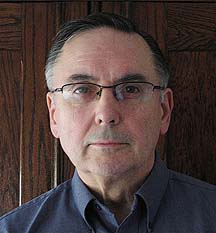
Dr. Jim Miller
How scientific discoveries have affected Christian ideology throughout the years will be explored in February during Tusculum College’s annual Theologian-in-Residence lecture series.
Dr. Jim Miller, president of the Presbyterian Association on Science, Technology and the Christian Faith, will be presenting a series of lectures, “Singing the Lord’s Song in a Strange Land,” about the relationship of science and religion. Lectures will take place each Tuesday of the month – Feb. 3, 10, 17 and 24 – in the series, sponsored by Tusculum College and partially funded by Ron Smith. Each lecture session will begin at 10 a.m. in the Chalmers Conference Center in the Niswonger Commons. The sessions typically end around 2 p.m., and lunch in the college’s cafeteria is included. There is no admission fee to the lectures.
Dr. Miller is an honorably retired ordained minister of the Presbyterian Church (U.S.A.). He has worked in the School of Engineering at North Carolina State University and served as an ecumenical campus minister at Michigan Technological University, the University of Pittsburgh, Carnegie Mellon University and Chatham College. From 1996-2007, Dr. Miller was the senior program associate for the Program of Dialogue on Science, Ethics, and Religion of the American Association for the Advancement of Science (AAAS).
He is the editor or co-editor of five books on science and religion including “The Church and Contemporary Cosmology,” “Cosmic Questions” and “The Epic of Evolution: Science and Religion in Dialogue.” Dr. Miller is also currently the co-chair of the Broader Social Impact Committee of the Human Origins Program at the Smithsonian’s National Museum of Natural History.
During the first session on Feb. 3, “The Baptism of Aristotle,” Dr. Miller will explore how the classical post-Socratic philosophy, particularly that of Plato and Aristotle, provided the primary intellectual framework within which the Christian faith and the cosmos were understood and its continuing influence on Christian faith today.
“How the World Was Divided,” the second session on Feb. 10, will focus on the Scientific Revolution of the 16th and 17th centuries that challenged previous thought and its practical theological legacy.
The third session on Feb. 17, “Trouble at the Foundations,” will explore the developments in geology, biology and physics that have been and are dramatically changing the understanding of nature and humanity’s place in the cosmos, as well as their theological significance.
In the concluding lecture on Feb. 24, Dr. Miller will consider what bearing scientific discoveries have on the Christian church and their implications for practical Christian living, individually and corporately, in the 21st century.
Although the series has no admission fee, reservations are required. For more information or to make a reservation for the series, please call 423-636-7304 or email eestes@tusculum.edu.


